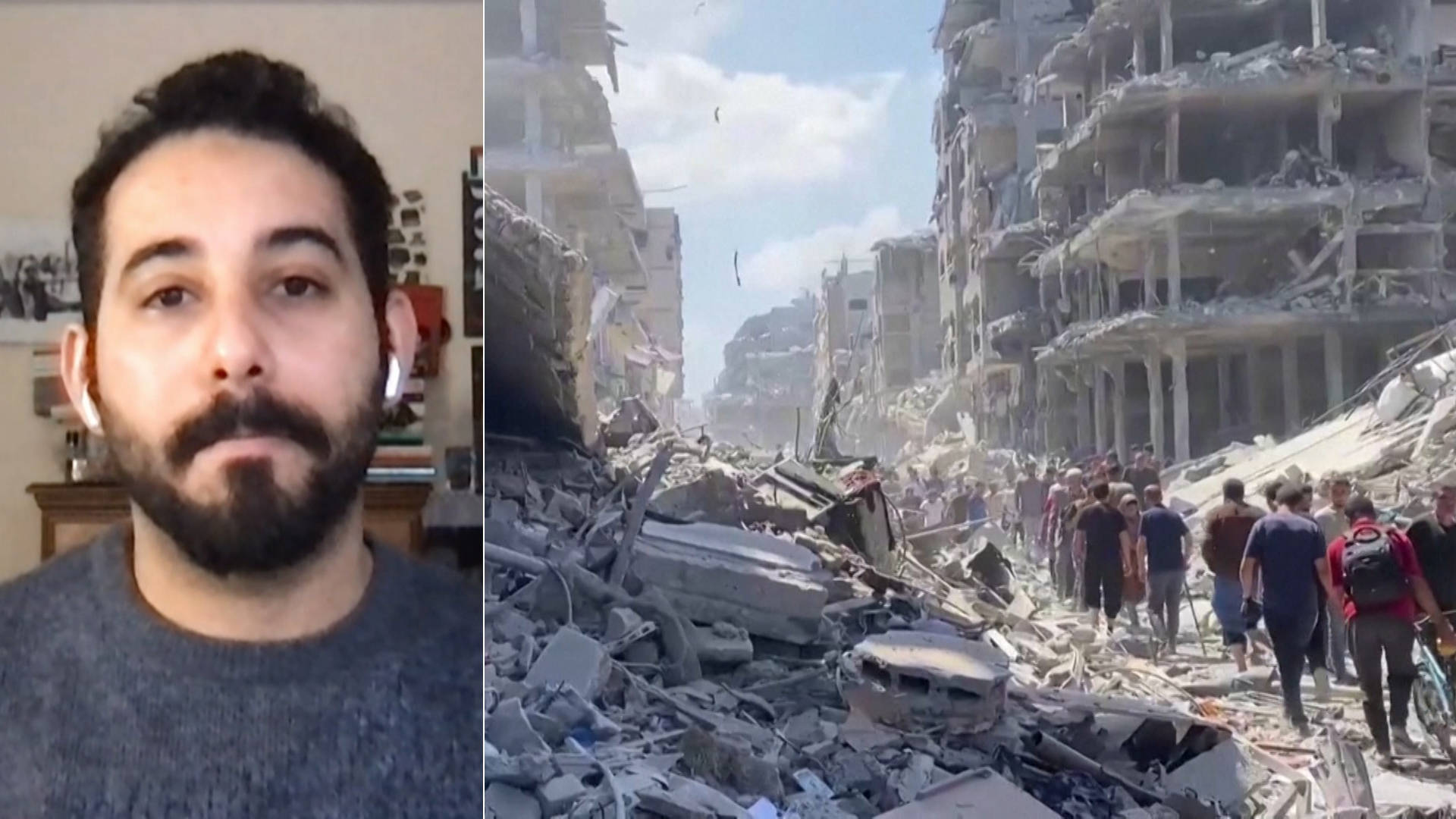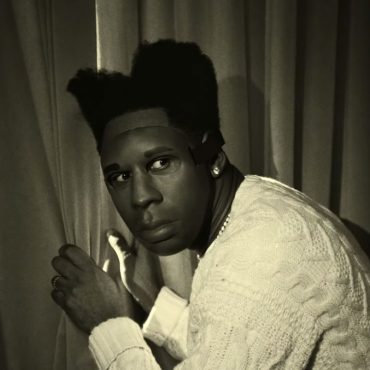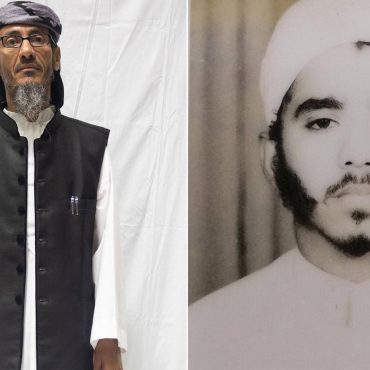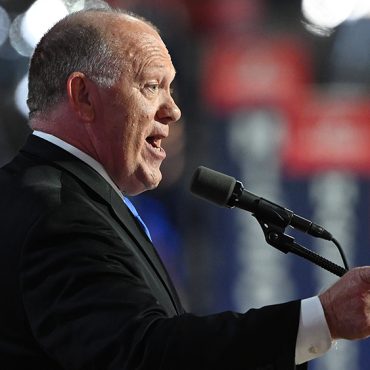This is a rush transcript. Copy may not be in its final form.
AMY GOODMAN: This is Democracy Now!, democracynow.org, The War and Peace Report. I’m Amy Goodman, as we turn now to Gaza, where Israeli forces are continuing their unrelenting attacks, killing scores of Palestinians, even as Israeli and Hamas officials resume talks in Qatar aimed at a ceasefire. Al Jazeera reports Israel carried out over a hundred bombings over the weekend. According to Gaza’s Health Ministry, 31 Palestinians were killed in the last 24 hours.
The U.N. is warning its efforts to bring humanitarian aid into the besieged Gaza Strip are at a breaking point, after Israeli forces opened fire on a World Food Programme convoy over the weekend. Staffers documented at least 16 bullet holes in their aid convoy’s three vehicles, saying the shooting left them “terrified.” More than 330 aid workers in Gaza have been killed since October 7, 2023, according to the United Nations.
Overnight on Monday, Dr. Thabat Saleem, a Palestinian neonatal doctor and volunteer at the Al-Aqsa Martyrs Hospital, was killed in an Israeli airstrike in the Nuseirat refugee camp. More than a thousand healthcare workers have been killed in Israel’s ongoing assault on Gaza, according to the Palestinian Health Ministry. Dr. Saleem’s killing follows the destruction of the Kamal Adwan Hospital, the last remaining hospital in northern Gaza. Over the weekend, the head of the World Health Organization once again urged Israel to release Dr. Hussam Abu Safiya, director of Kamal Adwan, from prison, after he was arrested by Israeli forces along with other medical workers during a raid on December 27th. But Israel is not confirming that they have Dr. Safiya.
For more on the deteriorating situation in Gaza, we’re joined in Syracuse, New York, by the acclaimed Palestinian poet Mosab Abu Toha. His recent piece for The New Yorker is headlined “Requiem for a Refugee Camp,” which focuses on Gaza’s largest refugee camp, now in ruins, Jabaliya. It’s where his grandparents grew up. Mosab Abu Toha, joining us from Syracuse.
Thank you so much for joining us again, Mosab. If you can talk about Jabaliya and all of this latest news we’re getting out of Gaza? You know, we spoke to you in Gaza when you were there with your family. We spoke to you after Refaat Alareer, your colleague, a fellow poet, was killed in an Israeli airstrike, professor at Islamic University. We spoke to you in Cairo when you had just gotten out with your family. We spoke to you in New York here in the studio when your book came out, Forest of Noise. And now we’re talking to you today, this utterly painful piece, “Requiem for a Refugee Camp,” that you’ve just published in The New Yorker. Talk about your experience and what — the centrality of this camp.
MOSAB ABU TOHA: Yeah. Thank you so much, Amy, for the coverage.
I mean, the painful thing is that we are talking about things today and next year, what happened, that we are talking about the same thing, the same losses, or even worse. So, today is the anniversary of my friend’s, Marouf Al-Ashqar’s killing. He was killed last year. And just two months ago, his father was killed in an airstrike. So, today is his first anniversary.
And the city Beit Lahia, which is next to Jabaliya, the Jabaliya refugee camp, is under the Israeli occupation. I mean, now, when we are talking about the Israeli occupation, we are no longer talking about settlements in the West Bank or, you know, Palestinian cities occupied by Israel in 1948, but now we can talk about the Israeli occupation of the Gaza Strip, because not only did they expel people — and this is what I’m talking about in my piece about the refugee camp. Not only did they expel people, many — I mean, most people in the Jabaliya refugee camp have been expelled by the Israeli occupation. They not only expelled these people, but they also blew up the houses in the refugee camp where people used to live for 70 or more years. I mean, the house where my maternal grandparents were born, where they grew up, where they had my mother and her siblings, this house does not exist anymore.
And this is really a very devastating thing for refugees. I mean, the refugee camp is a place that should have been a temporary place for people. They should be living in the refugee camp until they could return to the houses of their grandparents or their parents or even their own houses, in Yaffa, in Haifa, etc. But these people were expelled from the refugee camp. The refugee camp is destroyed. And these people are now living in other, newly constructed refugee camps. I mean, when we talk about refugee camps right now in Gaza, these are a group of tents that do not protect people from the heat, do not protect people from the Israeli airstrikes. And we watched so many airstrikes that Israel carried out that were targeting tents, especially in the humanitarian zone.
So, the Jabaliya refugee camp is the largest of the eight refugee camps in the Gaza Strip. It was a home for about 120,000 people, all of them refugees from cities and villages close to the Gaza Strip. So, it is a very devastating loss for people, not only to lose their friends, to lose their families, to lose their house, but also not to know whether they would be able to return to the refugee camp, which was supposed to be a temporary place. Just imagine, Amy, that you are expelled from your house in Yaffa in 1948, and then you live in a refugee camp, and then this same occupation comes and destroys the refugee camp. Now you are farther and farther from your dream of returning. Now you are dreaming of returning to the refugee camp. So, this is really the tragedy of the Palestinian people right now.
AMY GOODMAN: This latest news that we have, we don’t know where Dr. Abu Safiya is.
MOSAB ABU TOHA: Yeah.
AMY GOODMAN: Many people know his name, head of Kamal Adwan Hospital, because he has been reporting on the conditions of the hospital. And now Israel is saying they don’t have him. People are saying —
MOSAB ABU TOHA: Yeah.
AMY GOODMAN: — they saw him taken away. How is it that his lawyers cannot see him? You have the World Food Programme, the U.N. organization, their convoy fired upon.
MOSAB ABU TOHA: Yeah.
AMY GOODMAN: The number of health, medical personnel, from doctors to nurses to hospital staff, who have been killed in Gaza. Talk about the significance of this and what these hospitals meant for you when you lived in Gaza with your children and your wife.
MOSAB ABU TOHA: So, Amy, really, really, something that really devastates my heart is that we are watching these things happening as we are talking. I mean, we had the news that Dr. Hussam Abu Safiya was abducted from inside the hospital. We saw the hospital where he was working burned and turned into ashes. And we saw the news about the Hind Rajab family and Hind Rajab herself. And we saw doctors and journalists being targeted and killed. So we have all this news, and nothing is changing in the world in terms of taking action against Israel, punishing it. Not only, I mean, they did not give the Palestinians their rights, you know, that are guaranteed by international law, after 1948, but we are now watching a genocide being perpetrated by the same occupation, which was admitted to the United Nations just one year after it was established. Just imagine that it took Israel one year to become a member, a full member, of the United Nations. And now it’s been taking the whole world about 15 months, and we don’t know for how many more — it’s been taking them a long time even to stop Israel from perpetrating this well-documented genocide.
And I would like, Amy, to draw your attention that one day after the Israeli army or the Israeli forces denied their possession of Dr. Hussam Abu Safiya, one day later, the Israeli military spokesperson issued a statement that Dr. Hussam Abu Safiya is with the Israeli army, and he is interrogated because he is suspected of being a Hamas member. So, this was one thing that was issued one day after they denied their having Dr. Hussam Abu Safiya. So, I mean, this tells you that Israel, whenever they are under pressure, they will succumb. They will change their minds. They will say, “Oh, yeah, yeah. We have him, and he’s under interrogation. He is a suspected Hamas general. He’s a Hamas general. He is not even Hamas — he is not only Hamas. He is a Hamas general. He’s a very, very big guy in Hamas” — you know, a doctor who’s working, who is working with the patients, who refused to leave them, who was injured, whose son was killed. He could leave. He could leave Gaza any day, because he has a Kazakhstani citizenship.
And I would like to draw your attention to another thing, which is that the director of Al-Awda Hospital, Dr. Ahmad Mohanna, has been abducted by the Israeli forces from inside the Al-Awda Hospital for 350 days. And there is no information about this doctor. I mean, the world started to pay attention and to advocate on behalf of Dr. Hussam Abu Safiya, because, you know, he had some reports. He had an Instagram page. He has been talking about the situation. So people knew him. So, that’s why people want him to be out, you know, because they feel like they knew him in person. But this doctor, Ahmad Mohanna, this is the case of about hundreds of other people. These people, no one knows about them. You know, we haven’t seen — I mean, I’ve never seen Dr. Ahmad Mohanna. I’ve never seen a video of him. But he’s a doctor. He’s the director of the Al-Awda Hospital. And he’s been abducted for about 350 days, about a year, and there is no news about him, and no one talks about him. And this is the case of so many, so many people that we don’t know about, until they are dead, just like Dr. Adnan al-Bursh. He was abducted from the same hospital, Al-Awda Hospital. And the people paid attention to him when he died. And people, “Oh, yes.” I mean, we don’t want to die. We don’t want to suffer, for people or for governments to sympathize with us and say, “Oh, yes, let’s — we need to bring him back. He is innocent.” No, everyone in Gaza is innocent. Everyone in Gaza has been living this hell by Israel for decades, not for 15 months.
AMY GOODMAN: Mosab Abu Toha, I want to thank you very much for being with us, Palestinian poet and author. We’ll link your piece in The New Yorker, “Requiem for a Refugee Camp.” He’s the author of the award-winning poetry collection, Things You May Find Hidden in My Ear: Poems from Gaza. His latest book is called Forest of Noise.
Up next, we look at President Carter’s legacy in Latin America with Pulitzer Prize-winning historian Greg Grandin, but first we’ll play a clip of President Clinton — of President Carter, when I interviewed him at the Carter Center in Atlanta.











Post comments (0)